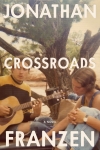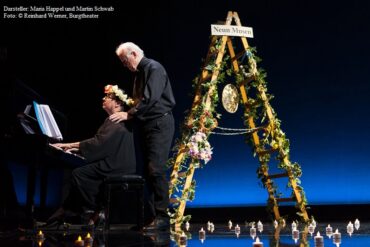Jonathan Franzen’s 2021 novel, Crossroads, explores the lives of two generations of the Hildebrandt family. The realist novel offers a captivating dive into the most vulnerable aspects of being human, free of artificial sweetness and excessive pathos.
By Sofija Popovska
Jonathan Franzen’s gift to the dreary year 2021, Crossroads, is a formidable realist novel and the first in a trilogy entitled A Key to All Mythologies. Almost 600 pages long and with more layers than one needs to bear, in Shakespearean terms, the slings and arrows of an outrageous Chicago winter, Crossroads is a tale of two generations that is both heartwarming and heartbreaking, nostalgic and grounded. Above all, Crossroads is a study of the many ways in which human existence is complex and its ease with the ideas of complexity and uncertainty is what makes it a unique and compelling read. While not flawless, Crossroads is enriching and a much-needed escape from the claustrophobically isolated Snoring 20s.
The Main Players
Set in 1970s New Prospect, a sleepy suburban town outside Chicago, the novel takes turns meticulously scrutinizing two generations of the Hildebrandt family: Reverend Hildebrandt, his wife Marion, and their children Clem, Becky, Perry, and Judson, all of whom but Judson – the youngest – lay bare their innermost thoughts, desires, and inner turmoils for the reader’s entertainment. Russ, a Reverend, is a flawed yet idealistic man; now past his peak and walking the downwards slope that follows, overcome with bitterness and reluctance, he finds himself surrounded by a landscape of tension and social fallout brought about by a recent scandal in a youth group he co-led together with the magnetic Rick Ambrose. On the boulevard of his broken dreams he is accompanied by Marion, upon whom he projects the fault for his inability to be hip with the youths, along with an array of personal failures.
Marion, seemingly the typical neurotic yet docile housewife, trailing behind a husband whose eye is now set on a charmingly boyish young widow, lugs behind her a past laden with tragedy, violence, and desolation, struggling to contain it behind a mask whose quickly forming cracks threaten to become irremediable. The parents’ plight is not unique to the older generation: The Hildebrandt children all struggle with erratically winding paths of their own. The life paths of these characters become collision courses as interests and ideologies clash, and at the center of this troubling yet fascinating matrix is the Christian youth group which exiled Russ, transformed Becky, and plunged Perry into the depths of despairing solitude: Crossroads.
The Power of Crossroads
Similarly to the Word in the Book of John, »Crossroads« is the magic word that was »with the book and that is the book«, that is to say, it applies to the literary world within the novel and its impact on its extratextual audience. Every level of the novel is a crossroads: On the individual level, the characters are torn between life-altering choices; on the societal level, the township of New Prospect is facing rapid and terrifying social changes, what with the growing movement for minority and women’s rights; finally, on the literary level, the novel offers an open-ended question: Can we know anyone, including ourselves? Crossroads is, above all, a book of revelations and as such each chapter uncovers bit by bit new aspects of situations and characters, allowing for epiphany moments – only to betray expectations and reveal epiphanies as what they truly are: Hasty assertions based on a perspective limited by incomplete knowledge. Ironically, the more is revealed, the less becomes clear. Newly emerging halftones on characters that seemed monochromatic at first only foreshadow that more remains in the dark yet.
Russ’s seemingly simplistic infidelity is born of the union of vanity and the desire to connect with and understand people’s worlds different from his own, while Marion’s milquetoast devotion serves to repress an intensely clever yet thoroughly unhinged version of herself. Similarly, Clem’s desire for self-sacrifice masks unhealed childhood wounds, while Becky’s search for authentic love lands her in a grey area where innocent exploration meets downright cruelty. The list remains incomplete, but it serves to acknowledge a pattern: Almost every character in Crossroads resists being understood definitively, regardless whether they are allotted a few sentences or tens of pages of description. Franzen’s cold-blooded willingness to look human complexity in the face is a symptom of the novel’s greatest quality: Crossroads is unafraid of difficult topics.

Jonathan Franzen
Crossroads
592 pages, 30,00$
Farrar, Straus and Giroux: New York 2021
The Courage of Crossroads
True to its ambitious aim for realism, the novel doesn’t present a narrative separated from the time and space which it occupies. While its psychological explorations are limited to forays into the minds of its white, middle-class main cast, it does not overlook or oversimplify when it comes to the theme of POC. Aware and wary of the white savior trope, Crossroads is meticulous in examining Russ Hildebrandt, whose push for social justice has yielded positive changes for the Black community in New Prospect, as well as for the Navajo community. He is presented as anything but a hero, nor does he see himself as such; still, his desire to help and empathize is tinged with judgment and self-congratulation. Instead of a shining example of a social activist he, like all Crossroads characters, is simply himself.
This is not to say the white savior trope is not present at all. Excluding it altogether would mean refusing to acknowledge the dominant attitudes among the liberal portion of the white community. Rather, it is purposefully employed: Frances Cottrell, unrestrained by the self-awareness that allows Russ to keep himself in check, proceeds to go on a furious tirade about a Black single mother for what she deems to be poor parenting while simultaneously neglecting her own son in favor of a new romantic interest, sulk at being denied the acknowledgment she expects for minimal acts of charity, and attend volunteer efforts for POC communities where she does little aside from demonstrating a visceral fear of anyone who does not share her skin color. Aside from its unforgiving treatment of white engagement in social justice, Crossroads additionally avoids representing its POC characters as a monolith. Its POC characters are few but starkly different, and handled with the same undecorated realism as its white cast. Some are stoical, some are troubled, some morally upright, while others morally questionable. While a small aspect of the novel, these characters are not reduced to plot devices or lionized martyrs. They are an equal part of the open question about human complexity and the limitations of knowing yourself and your neighbor.
Additionally, Crossroads delves into the difficult topic of mental illness, which is to be expected from a novel with as heavy of a focus on the human psyche. While every character suffers a low point, the novel veers into an exploration of inherited mental illness. Here, too, Franzen resists a simple and homogenous depiction. Marion and Perry, the two characters at the center of this theme, deal with this aspect of their lives differently. There are moments of hope and despair, relapse and rehabilitation, isolation and understanding – excluded, however, are the glamorizing and demonizing of mental illness. Crossroads is a powerful display of what can be achieved in terms of plot and characters: Its contents render it a puzzling, frustrating, enriching, gratifying page turner. However, when discussing a novel about complexity, it would be somewhat ironic to limit a review of it to its positive aspects. And so, we have arrived at its singular yet glaring flaw: the style.
The Achilles’ Heel
The novel’s main shortcomings become clear as the focus moves away from content and towards form. Franzen’s style is lacking in the sense that it does not allow for a lack: A novel as relentless in establishing the punishing causality of its characters’ actions as Crossroads is could benefit from the elision of decorative epithets and metaphors, curtailing all but the bare minimum. As a novel that attempts to minimize the distance between lived experience and the written word, Crossroads does not need the extra padding.
In this case, however, the extra is not only unnecessary, but also damaging. Shorter sentences, where every individual word carries more weight than in verbose ones, are more incisive and damning, which would only be complementary to the merciless twists and turns that Crossroads takes: The key would be to allow words to become an unsparing staccato of reality against the frail sheen of faith and limited human foresight. Instead, Crossroads offers infantilizing personifications such as »books waiting to be wanted« and interrupts a tense scene of Perry running into Russ and Frances, together when they should not have been, with descriptions such as »luckier snowflakes were blindly evading the Fury«. Unfortunately, the novel is littered with descriptions that miss the mark tonally and literary devices whose (mis)use breaks immersion. Moreover, in an attempt to convey his intelligence, which is tautological considering that every character’s thought processes are spelled out for the reader, Franzen endows Perry with the torturously stilted speech of the proverbial fedora-tipper, which makes an otherwise compelling tragic hero not only arduous to read about, but also inadvertently comical.
Still, it is advisable to give Crossroads a chance when choosing which book to read next. Despite its stylistic faults, Crossroads as a whole is a book worth the time and energy. It offers an unabridged exploration of various iterations of humanity, it evokes tragedy and catharsis, it contains its fair share of cliffhangers and thrill, and it creates an atmosphere with enough flesh and blood to serve as an escape for those who may seek it.






